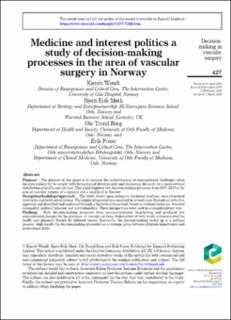Medicine and interest politics a study of decision-making processes in the area of vascular surgery in Norway
Journal article, Peer reviewed
Published version
Permanent lenke
https://hdl.handle.net/11250/2759515Utgivelsesdato
2020Metadata
Vis full innførselSamlinger
- Scientific articles [2181]
Originalversjon
Journal of Health Organisation and Management. 2020, 34 (4), 427-447. 10.1108/JHOM-04-2019-0103Sammendrag
Purpose – The purpose of this paper is to increase the understanding of organizational challenges when decision-makers try to comply with technological developments and increasing demands for a more rational distribution of health care services. This paper explores two decision-making processes from 2007–2019 in the area of vascular surgery at a regional and a local level in Norway. Design/methodology/approach – The study draws upon extensive document analyses, semi-structured interviews and field conversations. The empirical material was analyzed in several steps through an inductive approach and described and explained through a theoretical framework based on rational choice (i.e. bounded rationality), political behavior and institutionalism. These perspectives were used in a complementary way. Findings – Both decision-making processes were resource-intensive, long-lasting and produced few organizational changes for the provision of vascular services. Stakeholders at both levels outmaneuvered the health care planners, though by different means. Regionally, the decision-making ended up in a political process, while locally the decision-making proceeded as a strategic game between different departments and professional fields.Practical implications –Decision-makers need to prepare thoroughly for convincing others of the benefits of new ways of organizing clinical care. By providing meaningful opportunities for public involvement, by identifying and anticipating political agendas and by building alliances between stakeholders with divergent values and aims decision-makers may extend the realm of feasible solutions. Originality/value – This paper contributes to the understanding of why decision-making processes can be particularly challenging in a field characterized by rapid technological development, new treatment options and increasing demands for more rational distribution of services.

